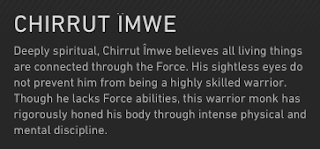FECKLESS FALSE SAVIORS
OF THE STAR WARS DYSTOPIA
A Review of Rogue One: A Star Wars Story
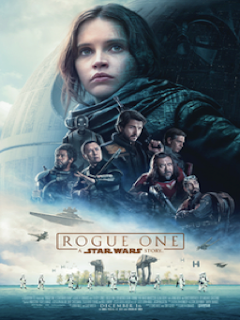 |
| Exhibit: Rogue One official poster[1] |
ANOTHER STAR WARS CHRISTMAS
Like its mega-blockbuster distant sequel, The Force Awakens (2015), Rogue One: A Star Wars Story, was strategically released to capitalize on the Christmas box office market this year. The movie debuted globally at $270 million over the weekend, nudging Disney Studios over the $7 billion record,[2] which indicates that folks are eagerly buying this particular entertainment product. But, Rogue One, a standalone Star Wars film, tells a dark and foreboding tale of pagan salvation that is diametrically opposed to the Scriptures, as well as the hope of the Christmas narrative given to us in the Gospels.
In this Star Wars tale, the future of the galaxy lies, not in a Savior sent from the one true God, but in the hands of a renegade band of cosmic commandos who commission themselves to steal the design plans of the Imperial Death Star—plans which betray a critical vulnerability detailing how to annihilate the planet-sized battle station from within. These feckless saviors utilize every weapon in their arsenal, including murder and mayhem, in order to fulfill this herculean mission to ultimately deliver the galaxy from the malicious oppression of the Evil Empire once and for all.
This standalone installment fills in various storyline gaps and sets up the first segment of the original Star Wars Trilogy, A New Hope. Hope is a definite casualty following the massive carnage depicted in this motion picture. The fully operational Death Star—manned by ruthless Imperial dictators Grand Moff Tarkin and the notorious rogue Jedi Knight Darth Vader—nearly vaporizes at least two planets, along with their multitudes of inhabitants. A horribly magnificent surgical obliteration shown in its full cinematic and apocalyptic glory.
While the Rogue One team succeeds in stealing these critical plans and smuggling them to Princess Leia, the entire Rebel Alliance cast is tragically martyred for their valiant efforts, including the newest heroine to the cast Jyn Erso (Felicity Jones), daughter to the reluctant scientist commissioned to create the Death Star from the beginning. Even the likeable, smart-tongued, re-programmed Imperial droid of Rebel officer Cassian Andor (Diego Luna), K-2SO, is blasted to smithereens in the last part of the film, to the sad gasps of the viewing audience. The body counts mount in this violent prequel/sequel.
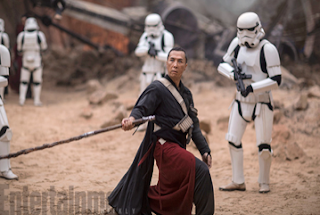 |
| Exhibit: Force-filled blind Warrior-monk Chirrut Imwe[3] |
ENTER: EASTERN MYSTICISM VIA A GALACTIC SAMURAI-MONK
The mystical underpinnings of the Star Wars universe, the ubiquitous Force, is embodied is the blind warrior-monk, Chirrut Imwe (Donnie Yen), who at first glance appears to be instead from the cast of The Last Samurai or the 1970s television series Kung Fu (a blind Master Po). Producers of the film made no attempt to hide his Eastern roots. Lacking a faithful Force-filled Jedi in the story, Chirrut’s character serves as the essential glue that fastens Rogue One to the rest of the Star Wars franchise.
Much of the on-screen devastation takes place the Jedha moon, home to Chirrut’s religious temple. The Rogue One director explains the “force-sacred world” of Jedha:
Director Gareth Edwards revealed some intriguing new details Lucasfilm’s Rogue One: A Star Wars Story. In particular, he talked about the planet Jedha in the story and how it is a force-sacred world. The director explained that Jedha becomes a combat zone in the story because it is a holy land that is inhabited by people who follow the force. Edwards told EW:
“The Force is basically in Star Wars like a religion, and they’re losing their faith in the period that we start the movie. We were trying to find a physical location we could go to that would speak to the themes of losing your faith and the choice between letting the Empire win, or evil win, and good prevailing. It got embodied in this place we called Jedha. It’s a place where people who believe in the Force would go on a pilgrimage. It was essentially taken over by the Empire. It’s an occupied territory… for reasons we probably can’t reveal. There’s something very important in Jedha that serves both the Jedi and the Empire. It felt very much like something we could relate to in the real world…”
“Within Jedha, even though there’s the oppressive foot of the Empire hanging over them, there’s a resistance that won’t give up and our characters have to go and meet people there to try and secure a person from this group. In a wider level, there must be loads of people who just believe in the Jedi and believe in the Force and have been affected by it. If it’s a really ancient religion, as Obi-Wan Kenobi said, it’s got to exist in thousands or millions of people in the galaxy.”[4][bold added]
CHANNELING THE FORCE
The Force of Star Wars once again plays a prominent role in Rogue One. We have warned about the esoteric religious roots of The Force previously. The Force, and its integral connection to the martial arts and Eastern mysticism, was examined in great detail in my article series-turned-e-book, Mainstreaming the Mystic Force, which can be viewed HERE.
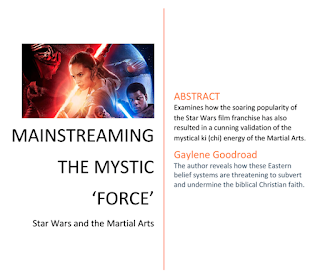 |
| Download this free e-book Mainstreaming the Mystic Force HERE. |
One movie reviewer expands on the warrior-monk character, Chirrut Imwe, and his intimate relationship with the Force:
There’s no chance of mistaking that the Force is present in Rogue One…. A little weaker and found in fewer instances than in previous installments, the Force can luckily still be wielded by a few characters, including Chirrut Imwe. But the real question remains: Just how Force-sensitive is Chirrut in Rogue One? Next to Darth Vader, Chirrut is probably the most Force-sensitive character in Rogue One. While he is not a Jedi (the implication being the Force would be stronger within him if so), Chirrut is able to channel the Force to act as his literal compass in the world.[5][bold added, link removed]
That Chirrut is “able to channel the Force to act as his literal compass in the world” ought to alarm all Christian believers. This is nothing short of witchcraft. [See specifically Part 3 of Mainstreaming the Mystic Force, “Manipulating the Force,” pg. 36]. The Force is a demonic and impersonal rival to the very personal Holy Spirit of God, Who lives within the believer, enabling, strengthening, teaching, etc. (2 Tim. 1:14; Heb. 2:4; 1 Jn. 2:27).
CONDITIONING ‘FORCE-SENSITIVITY’
Also troubling is the use of overt Buddhist methods to convert audiences over to a belief in the Force. Cleverly embedded into the screenplay dialogue of Rogue One is Chirrut’s favorite ‘Force’ mantra. A mantra is a Sanskrit word in the Hindu religion. It is a word or formula that is repeatedly chanted like an incantation or prayer. (This is also going on in the evangelical church, see HERE.)
Chirrut repetitiously recites a mantra throughout the film, which automatically becomes lodged in the viewer’s brain by the end of the movie—like a familiar song from the radio that gets stuck in your head. This serves as a dangerous spiritual chant as it becomes embedded in one’s brain, especially considering what it can do to children.
This “Force sensitivity” makes Chirrut an essential, albeit short-lived, character of the film:
Destined to be one of the most iconic lines from Rogue One is Chirrut’s mantra, “I am one with the Force. The Force is with me,” which he chants when he is trying to center or steel himself as he enters into battle. The line is also indicative how just how Force-sensitive Chirrut truly is. This Force-sensitivity makes even more sense when you learn Chirrut is a Guardian of the Whills and a “deeply spiritual… warrior monk,” per the official Rogue One website. As a Guardian, he prevents the Kyber crystals (which naturally carry the power of the Force) from being misused by others; this would explain why he can sense Jyn in the crowded market, thanks to the Kyber crystal she is wearing.
Chirrut’s role as Guardian and the sensitivity to Force-infused Kyber crystals invariably means that even though he is not a Jedi, he can use the Force when need be. Two notable times, aside from when he is able to wield a bow staff and take down dozens of Storm Troopers, include when he, Baze Malbus, and Cassian Andor are imprisoned by Saw Gerrera and Chirrut senses Bodhi Rook’s energy from the cell next to theirs; Chirrut also invokes his mantra and uses the Force during the battle at Scarif, guiding him to the control panel where he flips a switch that helps Jyn transmit the Death Star plans to the Rebellion.
 |
| Exhibit: “Blind” Master Po (Keye Luke) in Kung Fu
“Because a man can see, he does not look.” — Master Po [8] |
BLIND BUT ‘SEEING’
Blind Master Po, from the 1970’s television series Kung Fu, was a martial arts sensei to young “Grasshopper” Kwai Chang Caine (David Carradine). Po’s teaching is memorialized in a series of flashbacks by the elder Caine as he recalls his kung fu training at a Buddhist monastery run by Po, who is able to demonstrate super-human power and ability through Eastern mysticism (via the Force).[9] A pertinent quote from Po to young Caine is, “because a man can see, he does not look.” Master Po, of course, is teaching the Eastern concept of ki (chi or qi) energy (the Force) to navigate through the various battles of life. This unbiblical philosophy emphasizes an inward mystical sensing ability as opposed to a seeing objectivity with human reason and rote skill. This manipulation of the Force is vital to progression in the martial arts. [See again Part 3 of Mainstreaming the Mystic Force.]
But harnessing and wielding the Kung Fu/Star Wars Force is antithetical to Christianity.
There are few Christians hymns more memorable than John Newton’s Amazing Grace. Note the last line of this famous spiritual song (Eph. 5:19; Col. 3:16):
Amazing grace! How sweet the sound
That saved a wretch like me.
I once was lost, but now am found,
Was blind but now I see.[10]
The Lord Jesus Christ used the congenital blindness of a man as an object lesson to compare physical blindness to a lost spiritual condition. Only He can open unseeing eyes and save sinners from the eternal penalty of their sin by opening their spiritual eyes to see His amazing grace of salvation. When questioned by the Jewish leaders after the Lord healed and saved him, the man replied, “One thing I do know. I was blind but now I see!” (Jn. 9:25).
The sightless warrior-monk character of Rogue One reverses God’s grace. He remains in his blindness—both physically and spiritually—banking on the ethereal Force to direct his daily path and to ultimately protect him in the martial arts combat he encounters on a regular basis. In the end, he loses his soul as a mystical rebel martyr.
 |
| Rogue One merchandising at Amazon.com |
THE TRUTH:
There is no question that Rogue One is a well-crafted story replete with state-of-the art sound and visual effects sure to charm and mystify moviegoers. Troubling for the Christian believers, however, is that the dark power of this intoxicating medium embeds heretical beliefs into unsuspecting minds and hearts.
Chirrut’s blasphemous mantra: “I am one with the Force; the Force is with me” needs to be actively swept out of the thought chamber with biblical truths, such as the following verses:
which strengtheneth me.”
(Phil. 4:13)
nevertheless I live;
yet not I, but Christ liveth in me:
and the life which I now live in the flesh
I live by the faith of the Son of God,
Who loved me,
and gave Himself for me.”
(Gal. 2:20)
At Christmastime, believers ought to be reflecting upon the birth of our gracious Savior:
(Is. 9:6)
(Matt. 1:23)
But His humble birth had a much greater purpose. Our Lord Jesus Christ was born in a common stable just as the ancient prophets foretold, but He was destined to die on a tree to pay for the sins of mankind with His own blood (1 Pet. 2:24; Eph. 1:7; Rom. 3:25). Surely, He is the greatest gift ever given by God to His creation.
The Christmas message is full of real HOPE, love, and light—not the gloom, darkness, and futile salvation-striving offered by the Star Wars marketers.
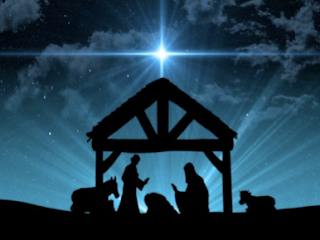 |
| Exhibit: Christmas manger scene[11] |
for those living in a land of deep darkness,
a light has shined upon them.”
(Isaiah 9:2)
that whosoever believeth on Me
should not abide in darkness.”
(John 12:46)
Endnotes:
[1] See Wikipedia: https://en.wikipedia.org/wiki/Rogue_One and Star Wars.com: http://www.starwars.com/films/rogue-one.
[2] Anthony D’Alessandro, Deadline Hollywood, “‘Rogue One’ Secures $155M Opening; Has Potential To Do Near-‘Titanic’ Size Business – Weekend Postmortem,” Dec. 19, 2016; see: http://deadline.com/2016/12/rogue-one-star-wars-story-preview-box-office-social-media-1201871704/
[3] Graphic taken from the Geek Tyrant website: http://geektyrant.com/news/new-photos-and-interesting-character-details-for-star-wars-rogue-one-including-darth-vader.
[4] Joey Paur, “New Details Revealed for Star Wars: Rogue One and the Force-Sacred World Jedha,”Geek Tyrant website; see: http://geektyrant.com/news/new-details-revealed-for-star-wars-rogue-one-and-the-force-sacred-world-jedha?utm_source=gametyrant.com&utm_medium=related.
[5] Allie Gemmill, “Is Chirrut Force-Sensitive In ‘Rogue One’? His Mantra Makes The Answer Pretty Clear,” Bustle.com; see: https://www.bustle.com/articles/200678-is-chirrut-force-sensitive-in-rogue-one-his-mantra-makes-the-answer-pretty-clear.
[6] Ibid. Gemmill.
[7] Chirrut Imwe taken from http://www.starwars.com/databank/chirrut-imwe
[8] Image taken from Classic Television Shows online; see: http://classictelevisionshows.blogspot.com/2013/04/kung-fu-everybody-was-kung-fu-fighting.html. Master Po quote from Wikipedia: https://en.wikiquote.org/wiki/Kung_Fu_(TV_series)
[9] See Wikipedia: https://en.wikipedia.org/wiki/Kung_Fu_(TV_series).
[10] See Wikipedia: https://en.wikipedia.org/wiki/Amazing_Grace.
[11] Graphic taken from Worship House Media online: http://www.worshiphousemedia.com/motion-backgrounds/34504/nativity-2.



